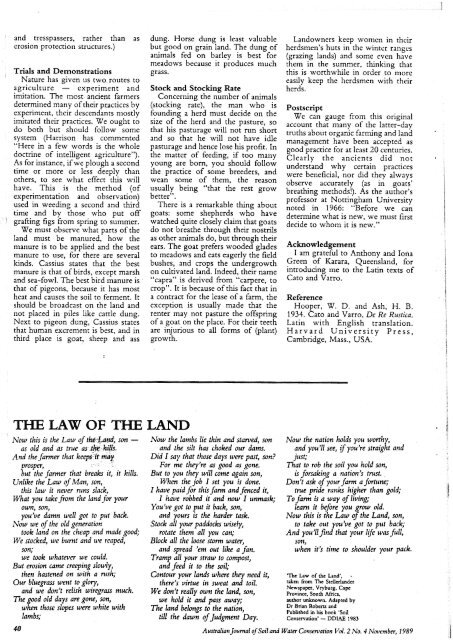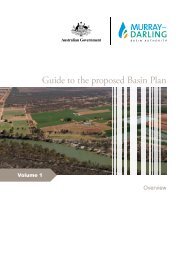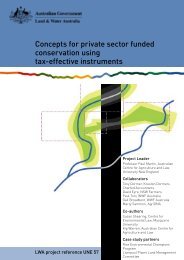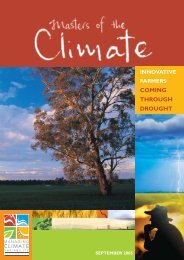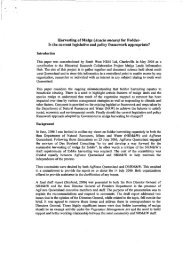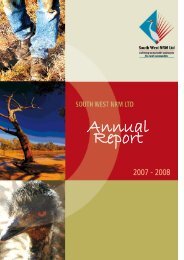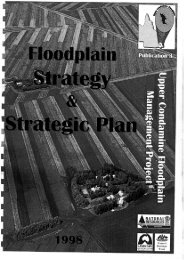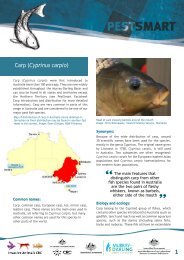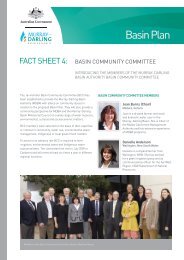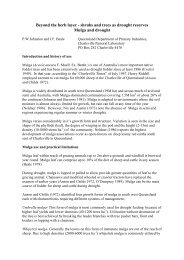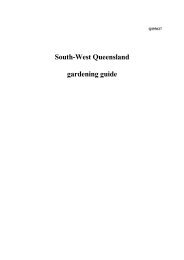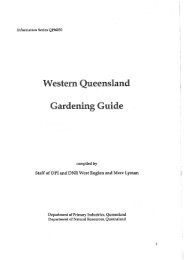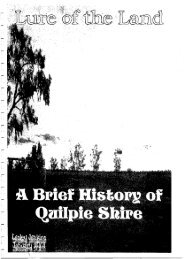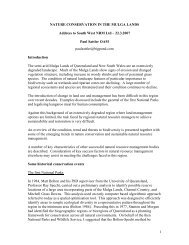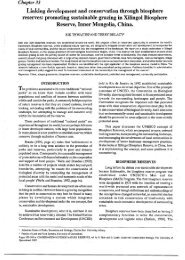soil-conservation-people-religion-and-land.pdf - South West NRM
soil-conservation-people-religion-and-land.pdf - South West NRM
soil-conservation-people-religion-and-land.pdf - South West NRM
You also want an ePaper? Increase the reach of your titles
YUMPU automatically turns print PDFs into web optimized ePapers that Google loves.
<strong>and</strong> tresspassers, rather than as<br />
crosion protection structures.)<br />
Trials <strong>and</strong> Demonstrations<br />
Nature has given us two routes to<br />
agriculture - experiment <strong>and</strong><br />
imitation. The most- ancient farmers<br />
determined many of their practices by<br />
experiment. thcir descendants n~ostly<br />
imitated their practices. We ought to<br />
do both but should follow some<br />
system (Harrison has commented<br />
"Here in a few words is the whole<br />
doctrine of intelligent agriculture").<br />
As for instance, if we plough a second<br />
time or more or less deeply than<br />
others, to see what effect this will<br />
have. This is the method (of<br />
experimentation <strong>and</strong> observation)<br />
used in weeding a second <strong>and</strong> third<br />
time <strong>and</strong> by those who put off<br />
grafting figs from spring to summer.<br />
We must observe what parts of the<br />
l<strong>and</strong> must be manured, how the<br />
manure is to be applied <strong>and</strong> the best<br />
manure to use, for there are several<br />
kinds. Cassius states that the best<br />
manure is that of birds, except marsh<br />
<strong>and</strong> sea-fowl. The best bird manure is<br />
that of pigeons, because it has most<br />
heat <strong>and</strong> causes the <strong>soil</strong> to ferment. It<br />
should be broadcast on the l<strong>and</strong> <strong>and</strong><br />
not placed in piles like cattle dung.<br />
Next to pigeon dung, Cassius states<br />
that human excrement is best, <strong>and</strong> in<br />
third place is goat, sheep <strong>and</strong> ass<br />
dung. Horse dung is least valuable<br />
but good on grain l<strong>and</strong>. The dung of<br />
animals fed on barley is best for<br />
meadows because it produces much<br />
grass.<br />
Stock <strong>and</strong> Stocking Rate<br />
Concerning the number of animals<br />
(stocking rate), the man who is<br />
founding a herd must decide on the<br />
size of the herd <strong>and</strong> the pasture, so<br />
that his pasturage will not run short<br />
<strong>and</strong> so that he will not have idle<br />
pasturage <strong>and</strong> hence lose his profit. In<br />
the matter of feeding, if too many<br />
young are born, you should follow<br />
the practice of some breeders, <strong>and</strong><br />
wean some of them, the reason<br />
usually being "that the rest grow<br />
better".<br />
There is a remarkable thing about<br />
goats: some shepherds who have<br />
watched quite closely claim that goats<br />
do not breathe through their nostrils<br />
as other animals do, but through their<br />
ears. The goat prefers wooded glades<br />
to meadows <strong>and</strong> eats eagerly the field<br />
bushes, <strong>and</strong> crops the undergrowth<br />
on cultivated l<strong>and</strong>. Indeed, their name<br />
"capra" is derived from "carpere, to<br />
crop". It is because of this fact that in<br />
a contract for the lease of a farm, the<br />
exception is usually made that the<br />
renter may not pasture the offspring<br />
of a goat on the place. For their teeth<br />
are injurious to all forms of @lant)<br />
growth.<br />
L<strong>and</strong>owners keep womcn in thcir<br />
herdsmen's huts in the winter ranges<br />
(grazing l<strong>and</strong>s) <strong>and</strong> some even have<br />
them in the summer, thinking that<br />
this is worthwhile in order to more<br />
easily keep the hcrdsmen with their<br />
herds.<br />
Postscript<br />
We can gauge from this original<br />
account that many of the latter-day<br />
truths about organic farming <strong>and</strong> l<strong>and</strong><br />
management have been accepted as<br />
good practice for at least 20 centuries.<br />
Clearly the ancients did not<br />
underst<strong>and</strong> why certain practices<br />
were beneficial, nor did they always<br />
observe accurately (as in goats'<br />
breathng methods!). As the author's<br />
professor at Nottingham University<br />
noted in 1966: "Before we can<br />
determine what is new, we must first<br />
decide to whom it is new."<br />
Acknowledgement<br />
I am grateful to Anthony <strong>and</strong> Iona<br />
Green of Karara, Queensl<strong>and</strong>, for<br />
introducing me to the Latin texts of<br />
Cato <strong>and</strong> Varro.<br />
Reference<br />
Hooper, W. D. <strong>and</strong> Ash, H. B.<br />
1934. Cato <strong>and</strong> Varro, De Re Rustica.<br />
Latin with English translation.<br />
Harvard University Press,<br />
Cambridge, Mass., USA.<br />
LAW OF<br />
Now this is the Law of t h w , son -<br />
as old <strong>and</strong> as true as 4% hi&.<br />
And the farmer that keeps ?t may<br />
- -<br />
prosper,<br />
but the farmer that break it, it kills.<br />
Unlike the Law of Man, son,<br />
this law it never runs slack,<br />
What you take from the l<strong>and</strong>for your<br />
own, son,<br />
you've damn well got to put back.<br />
Now we of the old generation<br />
took l<strong>and</strong> on the cheap <strong>and</strong> made good;<br />
We stocked, we burnt <strong>and</strong> we reaped,<br />
son;<br />
we took whatever we could.<br />
But erosion came creeping slowly,<br />
then hastened on with a nrsh;<br />
Our bluegrass went to glory,<br />
<strong>and</strong> we don't relish wiregrass much.<br />
The good old days are gone, son,<br />
when those slopes were white with<br />
lambs;<br />
40<br />
Now the lambs lie thin <strong>and</strong> starved, son<br />
<strong>and</strong> the silt has choked our dams.<br />
Did I say that those days were past, son?<br />
For me they're us good as gone.<br />
But to you they will come again son,<br />
When the job I set you is done.<br />
I have paid for this farm <strong>and</strong> fenced it,<br />
I have robbed it <strong>and</strong> now I unmask;<br />
You've got to put it back, son,<br />
<strong>and</strong> yours is the harder task.<br />
Stock all your paddocks wisely,<br />
rotate them a11 you can;<br />
Block all the loose storm water,<br />
<strong>and</strong> spread 'em out like a fan.<br />
Tramp all your straw to compost,<br />
<strong>and</strong> feed it to the <strong>soil</strong>;<br />
Contour your l<strong>and</strong>s where they need it,<br />
there's vidue in sweat <strong>and</strong> toil.<br />
We don't really own the l<strong>and</strong>, son,<br />
we hold it <strong>and</strong> pass away;<br />
The l<strong>and</strong> belongs to the nation,<br />
till the dawn ofludgment Day.<br />
Now the nation holds you worthy,<br />
<strong>and</strong> you'll see, ij you're straight <strong>and</strong><br />
just;<br />
That to rob the <strong>soil</strong> you hold son,<br />
is forsaking a nation's trust. .<br />
Don't ask of your farm a fortune;<br />
true pride ranks higher than gold;<br />
To farm is a way of living,-<br />
learn it before you grow old.<br />
Now this is the Law ofthe L<strong>and</strong>, son,<br />
to take out you've got to put back;<br />
And you'llfind that your life was full,<br />
son,<br />
when it's time to shoulder your pack.<br />
'The Law of the L<strong>and</strong>', -<br />
taken from The Stellerl<strong>and</strong>er<br />
Newspaper, Vryburg, Cape<br />
Province, <strong>South</strong> Africa.<br />
author unknown. Adapted by<br />
Dr Brian Roberts <strong>and</strong><br />
Published in his book 'Soil<br />
Conservation' - DDIAE 1983<br />
A ustralian~ournal qf Soil <strong>and</strong> Warn Consewation Vol. 2 No. 4 November, 1989


